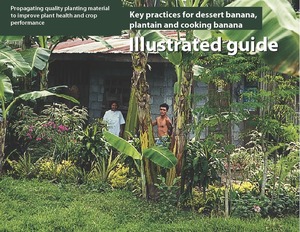Propagating quality planting material to improve plant health and crop performance. Key practices for dessert banana, plantain and cooking banana: Illustrated guide.
This illustrated guide summarizes the key practices for producing clean planting material of banana with a high yield potential for smallholders, depending on the pests and diseases which are present.
The guide is also designed to contribute to better planning of the propagation of planting material for rural development and disaster relief projects.




